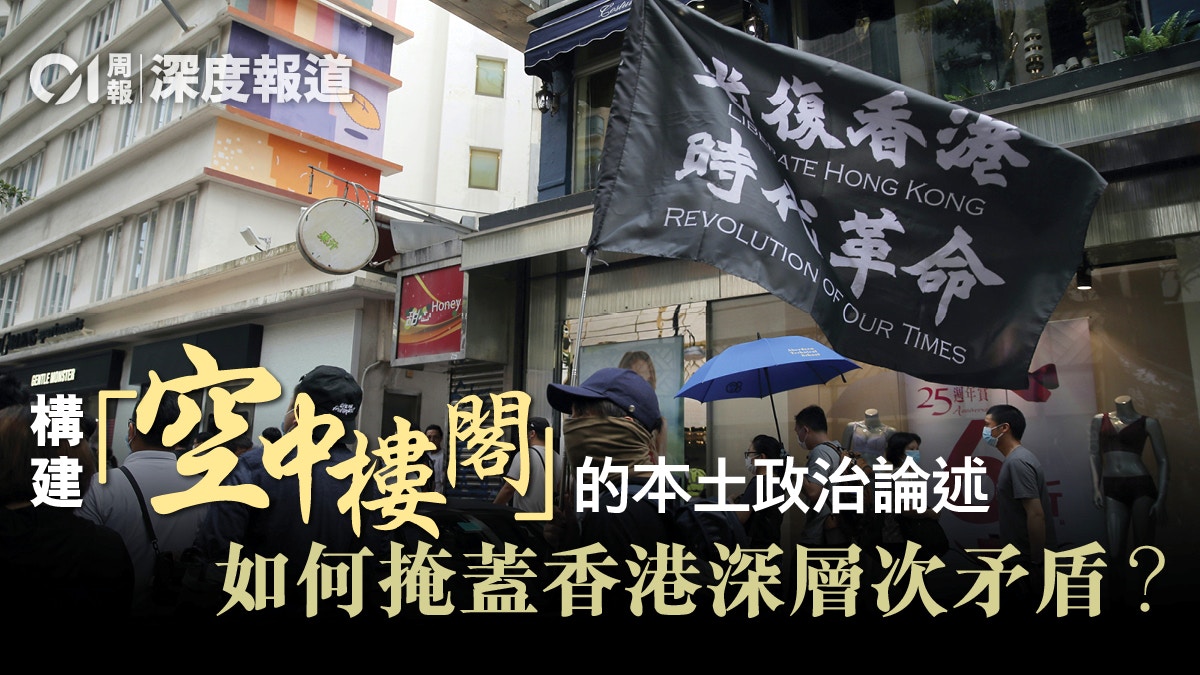weekly
Author: Cheng Xue
2020-07-06 19:00
Last update date: 2020-07-06 19:00On the eve of the adoption of the National Security Act in the Minato District, Chen Yun, known as the local "national teacher", announced his withdrawal from the social movement in Hong Kong, saying that most people do not need their theoretical guidance on social movement, but gave their destiny to Panmin Hong Kong Independence and pushed Hong Kong forward. Into the black hole of international political struggle. Chen Yun published the "Hong Kong City-State Theory" in 2011, proposing the "interest separation theory" between China and Hong Kong. He believed that Hong Kong should prioritize local interests to achieve mutual benefits with the Chinese government. The book became the best-selling work of the year, and was also referred to as the foundation work of the local school, which strengthened the subjective consciousness of "Hong Kong people". After many years, it is time to reflect on the various traps of its interest separation theory and understand the true root cause of the economic and livelihood dilemma of Hong Kong!
In the preface of "Hong Kong City-State Theory", Chen Yun introduced the metaphor of "crocodile theory", thinking that Hong Kong should keep its borders and develop the thinking of "Hong Kong standard, Hong Kong first, Hong Kong first" to achieve the purpose of anti-co-protection. This analogy is the epitome of Chen Yun's theory of the separation of interests: it originated from the contradiction between China and Hong Kong, discusses the conflict between the interests of the two places, and builds Hong Kong's local identity in the struggle.
Last year, there were collective actions against China's xenophobia, such as "Recovery to Sheung Shui" and "Anti-Freedom". (Profile picture)
The localism of "the castle in the sky"
The publication of the book echoed the "locust theory" that was rampant on the Internet at the time. While attracting a large number of readers, it also provided a theoretical foundation for the saying that "inland political, economic and cultural resources impact Hong Kong and occupy Hong Kong resources" and so on. Collective actions such as "Recovering to Sheung Shui" and "Anti-Freedom Movement" Since then, localist political discourse based on the theory of interest division has gradually become popular, and the various social and livelihood issues in Hong Kong are simply attributed to political conflicts between China and Hong Kong. For example, new immigrants seizing public housing cause Hong Kong people to go upstairs, and mainland visitors Panic buying milk powder to plunder Hong Kong people's resources and so on. However, is this really the case? If not, what reinforces our prejudice?
It is worth mentioning that the identity of Hong Kong people built on the basis of the theory of interest separation not only exacerbates the opposition and even hatred of the people in the land and port, but also blurs the subjectivity of Hong Kong, China. In short, it only emphasizes the institutional conflict between the "two systems", advocates the "division" and "fragmentation" of "river water does not violate well water", and blames Hong Kong's social problems on "ideological contradictions" under "one country" "I believe that the loss of core values in Hong Kong society leads to people's lack of livelihood, all because the Hong Kong government obeyed Beijing, allowing a large number of new immigrants and free travel to Hong Kong to snatch resources, resulting in no public housing at the grassroots level, and no middle-class purchase of private housing. Young people cannot find jobs, and elders cannot see doctors. Such a nativist argument is like a fancy blind eye in the hands of a magician, aiming to divert the attention of Hong Kong people from deep social contradictions.
Chen Yun, known as the "national teacher" of the local school. (Profile picture)
The Hong Kong government does not want to reform the superposition of civil resentment
The contradictions between Hong Kong's economy and people's livelihood have a long history. The most prominent contradiction in people's livelihood at the moment is actually the result of the deepening of the labor-management contradiction that prevailed before the return, that is, the widening gap between the rich and the poor, and the contradiction between small citizens and large financial groups.
Under such circumstances, the SAR Government does not think about reforms, and only relies on the influx of domestic funds into Hong Kong and the speculation and speculation activities it drives to maintain local economic growth. However, overall economic growth has failed to benefit the lower middle class. The Hong Kong government followed the "government-commercial co-governance pattern" during the British colonial period, and various policies were tilted towards the industrial and commercial sectors, resulting in the economic monopoly of the five major real estate consortiums. According to the "Industry Concentration Statistics" published by the Census and Statistics Department in October 2018, many industries closely related to people's livelihood are monopolized by large enterprises, such as food, alcoholic beverages and tobacco retail, fast food, land transportation and telecommunications. Industry, the top ten companies in the industry account for more than half of the industry's income, and this situation has been maintained for many years. At the same time, the industry has failed to provide more guarantees for the working class, resulting in a sharp increase in the cost of living, reduced opportunities for upper classes, and a widening gap between the rich and the poor.
The above excerpt is from the 221th issue of "Hong Kong 01" Weekly Newsletter (July 6, 2020) "Talking about how the xenophobic localities cover up the root cause of Hong Kong from the "national division" of China and Hong Kong's "interest segmentation theory". To read the full text, please click here to subscribe to the weekly report, or click here to preview the weekly e-newsletter for more in-depth reports.
More weekly articles:【01 Weekly News Page】
"Hong Kong 01" Weekly, available at major newsstands, OK convenience stores and Vango convenience stores.
Selected content of the 221 issue of "Week 01":
[Cover Report] Hong Kong Independence Thoughts-From Germination to Destruction
The passage of the "National Security Law of the Port Area" almost heralds the end of the local "Hong Kong independence" ideological trend. The localist "national teacher" Chen Yun announced his withdrawal from Hong Kong social movements, and made a note of this. However, where did this radical trend of thought come from? How to drag Hong Kong into a politically torn situation? Where will it go in the future?
[In-depth Interpretation] The Inheritance and Adjustment of China’s Criminal Law by the National Security Law of Minato
It is not difficult to see that the provisions of the Port Area National Security Law are basically based on the Chinese Criminal Law, which is the first attempt of the central government to try to unify the differences of "one country, two systems" at the legal level. Regardless of any political position, it is necessary to be calm and rational Look at this new Hong Kong law.
[01 Initiative] Four steps to reconcile with young people
One year after the anti-amendment campaign broke out, the number of people arrested is approaching 9,000, and they are facing legal prosecution, mostly young people. Criminal consequences alone may not make young people abide by the law. "Hong Kong 01" advocates supporting young people at the legal, psychological and social relations levels to help them solve problems and truly repair social tears.
[Other exciting content]
In Taiwan, Lu Sheng, who fought silently, faced nowhere
How do you not die against a cloud game console?
The epidemic prompts changes in the European art world
How can conspiracy theories succeed? Ignorance is the best entrance to fear
Chen Yungang's National Security Law One Country Two Systems Basic Law Basic Law 23 In-depth Report 01 Weekly Report




/cloudfront-eu-central-1.images.arcpublishing.com/prisa/3I74UEXLYRBBRPGPSGWNN6WXH4.jpg)








